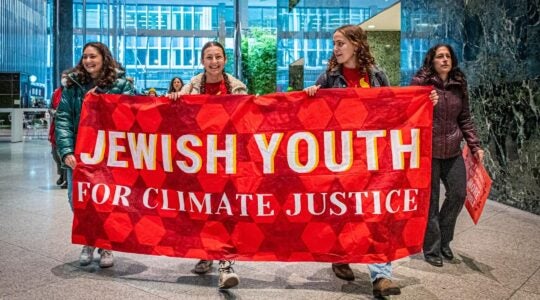HAIFA, May 5 (JTA) — The 55th anniversary of the independence of the State of Israel is not a round- number date, bearing the symbolic significance that makes it inviting to compose special summaries and forecasts. Nonetheless, it can be of real significance if Israel, in its current governmental and social composition, should decide to bestow significance and meaning upon it. A number of dramatic developments in the past year, internationally and domestically, provide the state with the strength and capability to adopt a different, better way in the coming year, to rescue itself from the deep crisis in which it has been shuffling its feet for the past two years. If I were to formulate the essence of my remarks in one sentence, I would say the following: Finally, the hour has arrived for the State of Israel to position and clarify its borders. First and foremost, the territorial boundary between Israel and the Palestinians; and, as a result, the time has also come to define the boundaries of Israeli nationalism. These new borders would beget a more appropriate and genuine settlement between the Jewish religion and Israeli nationalism. From that point it should be possible, in the foreseeable future, to legislate a written constitution for Israel that would better put together the fabric of social and economic relations. These dramatic and necessary steps are not a utopian vision. There is presently a clear majority, politically and ideologically, that would allow for the demarcation of these boundaries. And if Israel, in its 55th year, initiates this process, this negligible, non-round-number year is likely to be remembered as a key year. Since the Six-Day War, the State of Israel has excelled in its flexible and efficient political ability to continue the status of non-determination of essential issues. High and piercing talk referred the public to the future, but in the present, everyone comforts one another by dragging on with this indeterminate status. There has been a very sophisticated ability to sustain some kind of temporary social and governmental modus vivendi for conflicting trends running through Israeli reality. And this, all for some kind of shalom bayit — or domestic harmony — real or imaginary, which swept the most important questions under the carpet. The fear of a civil war, in which Jewish independence came to an end 2,000 years ago, deterred many from entering into the heart of the problem of peace and the territories. The famous statement by Moshe Dayan after the Six-Day War, “I am waiting for a telephone call from the Arabs,” became a cornerstone of Israeli policy, leaving to Arab initiative to determine the arrival of the most important and critical hour for the state — the hour for determining the final borders. But in the last few years, some of the repressed questions burst through the surface in a dangerous and frightening way, and they endanger not only security, but the sociopolitical fabric of the society that has been sustained here through years of hard work. Therefore, the hour has come to simply make the determination. Today, in Israel there are clear political forces capable of implementing the determinations without fear from anyone. There is a right-wing government, headed by a multi-powerful prime minister who had been considered part of the extreme right and today clearly admits that he recognizes the fact that Israel cannot rule over another people forever — and that in the end, a Palestinian state will be established. A prime minister like this has a clear majority for new policy. Accordingly, the first deed that has to be done this year is to define a clear political boundary between us and the Palestinians — whether by mutual agreement, which still seems virtually impossible, or by unilateral Israeli withdrawal. Perhaps this first boundary, with official passages existing at each border control point, will not be congruent at all points with the final border. However, they will mark the beginning of the clear separation between two national entities — the intermingling of which has become intolerable, and the major reason for the ease with which terror can run rampant in Israel. Zionism means borders. This fundamentally changes the classic Jewish situation of perpetually living without borders, and constantly crossing borders. Following two and a half years of a bloody, murderous intifada, both sides implore for separation, exhausted by empty words about possible coexistence, integrating the blood cycles of the two nations for yet more bloodletting — one of the other. The occupation of Iraq by the coalition forces, and the realistic possibility for replacing the heinous regime of Saddam Hussein with a democratic regime that will not be inclined toward war against Israel, removed a major threat. This will allow Israel to be much more relaxed and secure in a unilateral withdrawal from the West Bank. The physical, territorial border will also better facilitate the cohesion of a national Israeli identity, and the creation of a more appropriate and healthy relationship between the Jewish majority and the other minorities — different religious and national minorities. The fact that a distinctly moderate, secular party, Shinui — with separation of religion and state engraved on its banner — won so many votes in the last elections not only allowed it to be a distinguished partner in the current government, but also to stipulate its sitting in the government on the condition that the ultra-Orthodox parties not be included. This opens a new and fascinating possibility for Israel to work out a more ethical balance of relations that traverses the span of religious and secular members of the society. No more parasitism of entire religious sectors on the back of the secular public, but rather relations of equality that will demarcate clearer boundaries between religion and politics, between legitimate cultural activity that relies on the traditions of the Jewish people and perpetual economic parasitism. These dramatic reforms are not a dream, but rather a possible reality. For the first time, there is a clear political majority in the Knesset that can not only bring about the realization of these changes, but also well understands that if these new borders are not put in place, the deteriorating security will continue to accelerate economic decline — and the poverty, unemployment and terrorism will result in the disintegration of the new Israeli nationalism, created from the hard work of the founding fathers.A.B. Yehoshua is one of Israel’s best-known authors and playwrights. This article was translated by Harriet Gimpel, a translator who works with Israeli nonprofit groups.
JTA has documented Jewish history in real-time for over a century. Keep our journalism strong by joining us in supporting independent, award-winning reporting.





